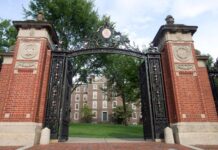
Michael Gotera, a Nevada native, wasn’t sure what to study when he began as a freshman at Johnson & Wales University in Providence but decided to pursue a major in marketing.
“I didn’t know anything about the industry, but I bit the bullet and found my niche,” said the senior who participated in the school’s Ad Team, a student group of marketing majors that recently competed in the American Advertising Federation’s annual National Student Advertising Competition.
Gotera described the social media and marketing “niche” he plans to pursue after completing coursework in the fall as a career “no one talked about” five or 10 years ago.
What intrigues him most about the role of social media in marketing is its newness. And, after nine months developing a pitch for Tai Pei, an Asian frozen-food company and the 2017 NSAC case study business, Gotera said he is better prepared to apply for the new role of social media manager at marketing agencies.
For the first time in the program’s history, the 31-person JWU Ad Team took first place at this year’s NSAC held in New Orleans. This was the sixth JWU team to participate in the national competition in seven years. Similarly, last year, a University of Rhode Island social media and marketing class took first place rank in the Acura Marketing Challenge. Managed by Mullen, the Boston-based firm that markets Acura, and EdVenture Partners, an organization partnering schools with marketing agencies, students targeted their promotions to millennials.
Given past successes of Rhode Island-based schools, how are schools using real-world experiences to train marketing students and is this exposure integral to their future success?
NSAC participation was particularly helpful, said Gotera, for two reasons: It exposed him to art direction, an area of the marketing industry that he admitted was “outside his comfort zone,” and required him to complete a project similar to what’s expected of a working professional.
Gotera said he would not have dipped his toe in art direction if it hadn’t been for the Ad Team.
“What’s scary with college students and the advertising industry is that they think they need to know everything before they get into college,” he said.
Gotera is thankful the team’s advisers placed him in art direction: “I understand that realm of advertising now and it’s not something that’s holding me back anymore.”
A senior, this was Gotera’s first year on the Ad Team. With graduation on the not-too-distant horizon, he said the work was timely “because it mirrors what people are doing in the industry now.”
Christine A. Ure, associate professor of advertising and marketing communications, has used experiential teaching methods throughout her 12-year tenure at JWU, and said the practice “brings the material to life.”
Ure, one of Gotera’s advisers, said participation in real-life training models makes students “much more marketable when they graduate” because they have been exposed to the level of scrutiny to which industry professionals are held.
Calling the marketing industry “extremely competitive,” Ure said it’s paramount marketing students receive training like the NSAC because if they don’t, “a recruiter isn’t going to bother to look at them. … Human resources professionals understand if students go through this endeavor, they are ready to hit the ground running.”
Oscar Chilabato, Ad Team co-adviser and associate professor of marketing, celebrated his 19th year supporting JWU students at the annual NSAC in 2017. He remembers starting out in an industry in which two types of software programming were dominant. Today, he said, there are hundreds that students must know.
“Even at the entry level … expectations have risen and that’s largely a function of technology,” added Chilabato. “The more we can give students specific skills and knowledge relative to the tasks they’re going to do, the more equipped they will be in the workforce.”
Christy Ashley, an associate professor of marketing at URI, agrees experiential learning can help prepare a student by building a resume that will make them more attractive but said “there are tradeoffs.”
Unprepared students see less of a return because they “get out of it what they put in,” she said.
“If you look at it from the lowest common denominator, there are some students that will learn a lot less than if they were in a traditional text-based class,” taking multiple-choice exams, she added.
In addition, while these opportunities allow the student “freedom, flexibility and creativity” paired with client oversight, they do not have the resource of more-experienced colleagues with which to review their progress.
And, often, she said, some of the tasks they are asked to complete in the pitch process “go beyond what they will do in an entry-level position.”
Ashley said she chooses to include experiential learning methods in her curriculum on a course-by-course basis, saying it “doesn’t always fit [the] desired learning outcomes.”
However, she thinks experiential learning practices, such as NSAC and the Acura Marketing Challenge, may be more important for marketing majors than accounting majors. The difference is that marketing majors, whose work is based on writing and communication skills, “are competing with students from a lot of other majors” who will graduate with similar expertise.
In addition, she said, such competitions allow current students to interact with their peers from similar institutions, measuring up to those who will be vying for the same positions come graduation.












